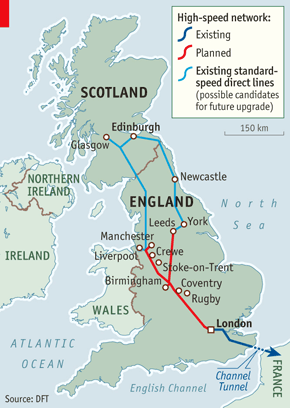The benefits of building a new $52-million HSR that connects London to northern England are plausible but not persuasive, says The Economist.
Largely skeptical of change, the British public is divided on the issue. To the extent that the project will "ameliorate the north-south divide in Britain's economy and prosperity" once it is completed in two decades' time, people simply aren't convinced that either the change is real or the deadline can be met. What's more, some have expressed concerns over the environmental impact that the proposed construction will have in Chilterns, an area about 40 miles northwest of London known for its picturesque view and is home to affluent voters.
The case can be made that there is always a need to build the latest transportation infrastructure. Whether the upgrade, expansion, or replacement of the existing rail network justifies the cost depends in no small part on the urgency of need, particularly for advanced economies like Britain.
From the vantage point of practicality, "Britain's infrastructure demands are different from other countries'. Its regular trains are already faster than most other nations' equivalents. [The country] is sufficiently small that even without pricey futuristic technology, Manchester and Leeds are only just over two hours from London. And a greater proportion of the population is already connected to the road and rail network than elsewhere in Europe."
Calling the proposal a "railroad to nowhere," The Economist points out that the money "at its disposal might well yield a higher return if it were spent on less glitzy schemes, such as road improvements and intra-city transport initiatives."
FULL STORY: Railroad to nowhere

Planetizen Federal Action Tracker
A weekly monitor of how Trump’s orders and actions are impacting planners and planning in America.

Chicago’s Ghost Rails
Just beneath the surface of the modern city lie the remnants of its expansive early 20th-century streetcar system.

Amtrak Cutting Jobs, Funding to High-Speed Rail
The agency plans to cut 10 percent of its workforce and has confirmed it will not fund new high-speed rail projects.

Ohio Forces Data Centers to Prepay for Power
Utilities are calling on states to hold data center operators responsible for new energy demands to prevent leaving consumers on the hook for their bills.

MARTA CEO Steps Down Amid Citizenship Concerns
MARTA’s board announced Thursday that its chief, who is from Canada, is resigning due to questions about his immigration status.

Silicon Valley ‘Bike Superhighway’ Awarded $14M State Grant
A Caltrans grant brings the 10-mile Central Bikeway project connecting Santa Clara and East San Jose closer to fruition.
Urban Design for Planners 1: Software Tools
This six-course series explores essential urban design concepts using open source software and equips planners with the tools they need to participate fully in the urban design process.
Planning for Universal Design
Learn the tools for implementing Universal Design in planning regulations.
Caltrans
City of Fort Worth
Mpact (founded as Rail~Volution)
City of Camden Redevelopment Agency
City of Astoria
City of Portland
City of Laramie




























